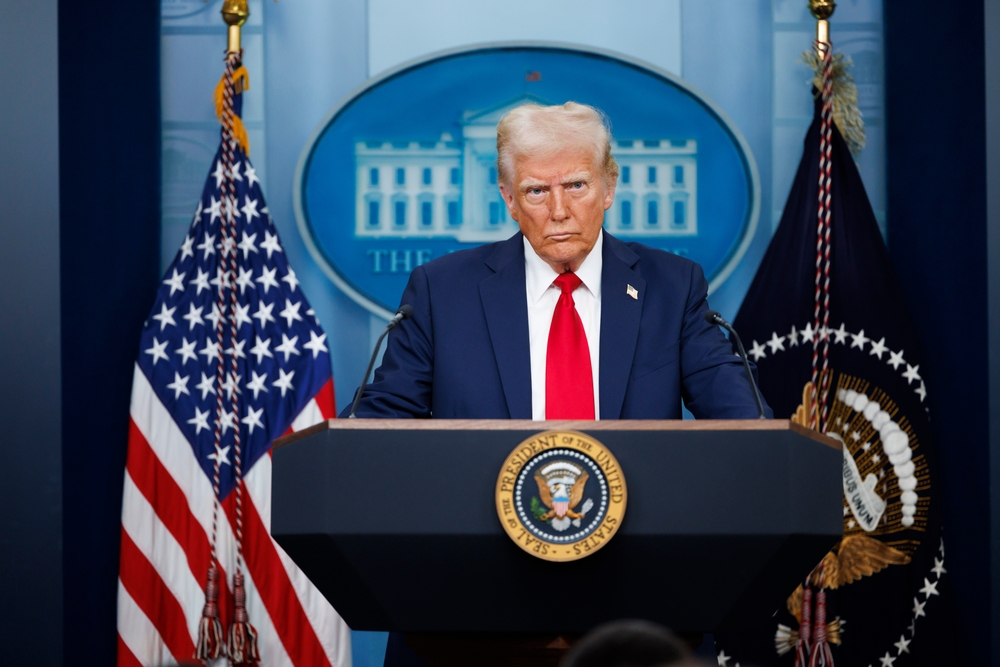Backlash Follows Trump’s Autism Claims at Kirk Memorial

Picture this: an arena filled with thousands, hearts heavy, eyes wet. Arizona’s State Farm Stadium became a place not of celebration but of mourning, as people gathered to honor the life of Charlie Kirk, a 31-year-old activist whose sudden death left many searching for words that could heal the silence he left behind. His wife’s trembling voice carried love and loss. Friends stood up to speak of his devotion. The air itself felt thick with sorrow.
Then came the moment everyone waited for. Donald Trump rose as the final speaker, greeted by thunderous applause. Here was a man many expected would close the ceremony with solemn remembrance. Yet what began as tribute shifted unexpectedly, and with it, the mood of the room. A eulogy became something else entirely—confusing those who came to grieve and igniting outrage that quickly spread beyond the walls of that stadium.

The Shift From Honor to Headlines
In moments of loss, words hold extraordinary power. They can soothe, they can honor, they can lift the spirit of a grieving community. But they can also change the entire direction of a ceremony.
At Charlie Kirk’s memorial, Donald Trump began by honoring his friend, describing him as “one of the brightest lights of our times” and “a great American hero.” For a grieving audience, these words offered a moment of comfort, a recognition of the life that had been taken too soon.
But the speech did not end where many expected. Midway through, the eulogy veered. Trump declared, “Tomorrow we’re going to have one of the biggest announcement ever, really, medically, I think, in the history of our country. I think we found an answer to autism.” He spoke of prevention, of helping parents, of unveiling a priority that he claimed had been pursued urgently behind the scenes.
As he pressed on, the tribute sounded less like remembrance and more like a campaign-stage revelation. “I’ve been bugging everybody over there. Get the answer to that,” he said, adding that “20 years ago, 1 in 10,000 were born with autism” compared to “the most recent survey [saying] 1 in 12.”
For many in attendance, the pivot was jarring. A space intended for reflection on a life lost became the stage for a sweeping health declaration. And in that shift, the memorial became more than a goodbye—it became the spark of a national controversy, a reminder that the context of our words can matter as much as the words themselves.
When Announcements Interrupt Grief
Life has a rhythm, and so does leadership. Some moments call for silence, others for truth, and others still for vision. The challenge is knowing when each belongs.
Two nights before the memorial, at a dinner hosted by the American Cornerstone Institute, Trump had already dropped hints of what was to come. He told the room, “We’re going to have an announcement on autism on Monday. I think it’s gonna be a very important announcement. I think it’s gonna be one of the most important things that we will do.” The words were not meant for mourning; they were crafted for anticipation, a promise that history was about to turn a page.
By the time he repeated the message at Charlie Kirk’s funeral, it became clear the eulogy was part of a larger rhythm. A preview whispered at a dinner. A headline unveiled at a memorial. A formal rollout scheduled for the week ahead. The sequencing was intentional, each moment building on the last.
But here is the paradox: what can feel like strategic timing for politics can feel like intrusion in grief. A funeral is not just another stage. For the mourners inside that stadium, the pivot from memory to medical declaration blurred the line between personal loss and public spectacle.
This is why the words echoed far beyond the crowd. They didn’t just announce policy. They raised a deeper question—when leaders speak, do they honor the moment, or do they bend the moment to fit their message?
The Truth Beyond the Headlines
When it comes to autism, the truth is far more complex than a podium promise. Science does not move with applause—it moves with patience, study, and humility.

Researchers have spent years examining whether acetaminophen, the common pain reliever many know as Tylenol, might play a role in neurodevelopmental disorders. A 2025 study from Mount Sinai found a statistical association between prenatal use and higher risks of autism and ADHD. Yet the authors themselves urged caution. Observational studies can suggest connections, but they cannot prove cause and effect. Science requires more than numbers—it requires context.
Other research offers a different lens. A Swedish sibling-comparison study, published in JAMA, reported no significant difference in autism rates once genetic and familial factors were accounted for. That finding suggested that earlier associations may not have been as straightforward as they seemed. In other words, the story is still being written, and the ink is not yet dry.
Vaccines, too, have been pulled into this conversation, but here the evidence is resounding. Decades of large-scale studies reviewed by the CDC and the World Health Organization have shown no link between vaccines and autism. The original paper that sparked this idea was retracted long ago, exposed as flawed and misleading. Still, the shadow of that narrative lingers, resurfacing whenever fear outweighs fact.
Leading health authorities, from the FDA to the American College of Obstetricians and Gynecologists, continue to affirm that acetaminophen is generally safe when used responsibly during pregnancy. They remind us that untreated fever or severe pain can itself endanger both mother and child. This is not politics—it is consensus born from years of careful review.

And so, the scientific reality is this: autism has no single cause, no easy cure, no “answer” that can be unveiled in a speech. It is a condition shaped by genetics, environment, and mystery. To pretend otherwise does not serve families, it only risks eroding their trust. Real progress comes not from shortcuts, but from honesty—and from the courage to say, “We are still learning.”
Echoes of Doubt and Disbelief
The words spoken at that funeral did not stay contained within the stadium walls. They traveled—through television broadcasts, through headlines, through the feeds on our phones—and with them came a wave of reaction that revealed just how fragile the conversation around health can be.
Scientists and medical leaders were quick to respond. Experts interviewed by CBS News described the claims as distortions of the evidence, with one epidemiologist admitting she felt “sick to my stomach” hearing autism tied so casually to Tylenol and vaccines. The FDA, in its own statement, reminded the public that while some studies raise questions, no conclusive link has ever been found between acetaminophen use in pregnancy and autism. The American College of Obstetricians and Gynecologists reaffirmed the same, stressing that the drug is generally safe when taken as directed. These voices may not have carried the drama of a stadium microphone, but they carried something more important—credibility.
At the same time, ordinary people made their own judgments. On social media, one attendee pleaded, “Come on Donald Trump… this is the memorial service. Stay on the topic.” Another wrote, “Donald Trump is using his Charlie Kirk tribute to talk about how he might have the answer to autism.” For many, it wasn’t just the content of the claim that stung, but the timing. In a place meant to honor life, the moment became about controversy.
This collision of authority and doubt, of applause and outrage, shows us something profound: truth is not decided by who speaks the loudest. Truth emerges when voices are tested, when evidence is weighed, when the moment is given the respect it deserves. The reaction to Trump’s words was not simply about science—it was about trust. And trust, once shaken, takes much longer to rebuild.
The Responsibility of the Microphone
Every stage is a mirror. It reflects not only the speaker, but the weight of their words on everyone listening. A microphone is never neutral—it amplifies truth or it amplifies confusion. And in times of grief, that responsibility becomes even heavier.
What happened at Charlie Kirk’s memorial forces us to confront a bigger question: what do we expect from leaders when they stand before us in our most vulnerable moments? A funeral is sacred ground. It is where silence speaks louder than speeches, and where words should bind wounds rather than open new ones. To step into that space and turn it into a platform for unverified medical promises is not just unusual—it risks breaking the fragile trust between leaders and the people they claim to serve.
This is not about politics alone. It’s about the ripple effect of words. A mother who hears that Tylenol could harm her unborn child may hesitate the next time she feels fever rising. A parent of a child with autism may cling to the illusion of a cure that science has not yet given. And millions watching may walk away believing that certainty exists where it does not.
The microphone is powerful. It can heal, or it can harm. Leaders hold it, but we, as listeners, must also hold them accountable. Because the true measure of leadership is not in how loudly one speaks, but in how faithfully one aligns their words with truth, compassion, and respect for the moment.
Beyond the Noise: Learning to Listen Again
In a world where every headline screams for attention, where every speech competes for dominance, we often forget the quiet art of listening. Not the kind of listening that waits for a pause so we can reply, but the kind of listening that allows truth to emerge.
What happened at Charlie Kirk’s memorial was not only about what was said. It was also about what wasn’t heard. The grief of a widow. The stories of friends. The silence of thousands who came to honor, not to debate. When a leader redirected the moment, those voices were drowned out by the weight of politics and promises.

But here is the lesson for us: we are not powerless in this noise. We can choose to listen differently. We can pause before we share, question before we believe, and hold space for the voices that matter most—the ones rooted in love, science, and compassion. Listening is an act of resistance against confusion. It is how we honor not just the dead, but the living who are trying to make sense of a world full of competing narratives.
Maybe the change begins here, with each of us reclaiming the discipline to filter through the noise. Because when we learn to listen again, with both heart and mind, we give ourselves the chance to find clarity in a time that desperately needs it.
Loading...

